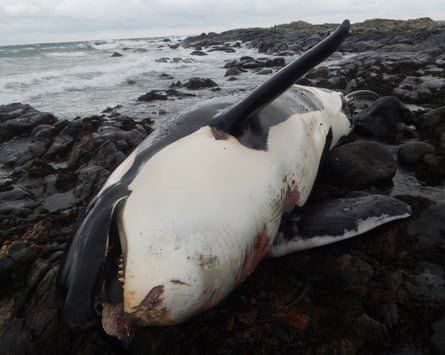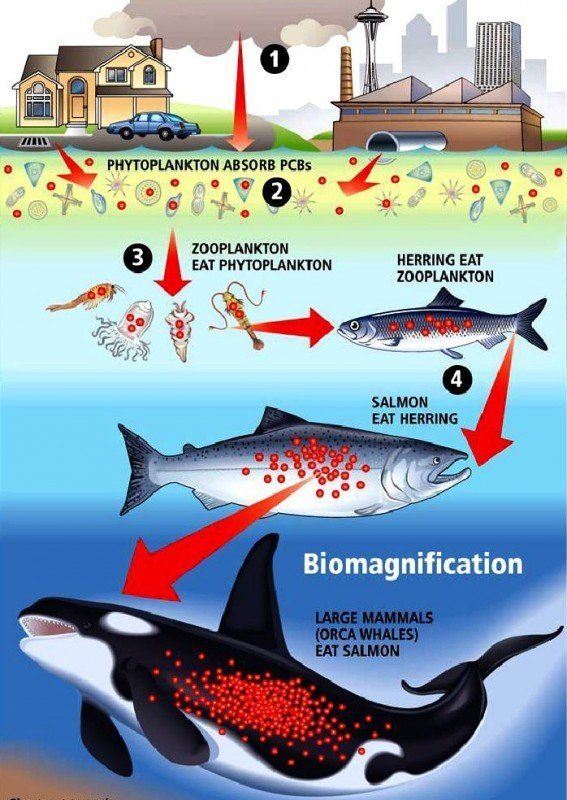Toxic pollutants: the Biggest Threat to Killer Whales!
Toxic pollutants: The biggest threat to killer whales.
ORCA Sci-Comm Team | July 23rd, 2020.
We already know about plastic pollutants causing harm to marine wildlife. However, did you know that there is another human-made pollutant that is causing damage to our marine environments? Persistent organic pollutants are having significant health impacts on our marine mammals and are threatening successful reproduction in Northern Hemisphere Killer Whales.
Persistent Organic Pollutants(POPs) are chemicals that are believed to cause significant negative impacts on the environment. POPs bioaccumulate in organisms, meaning that the concentrations increase more quickly than the body is able to get rid of the substance. POPs also have the ability to bio-magnify throughout the food chain where the concentrations of POPs are highest in the organisms that are found at the top of the food chain, such as apex predators (Stuart-Smith and Jepson,2017). Bioaccumulation and biomagnification have been illustrated in figure 2.
One of the chemicals belonging to POPs is Polychlorinated biphenyls (PCBs). This toxin was an organic pollutant that was banned 40 years ago, but it continues to devastate marine life. The PCBs were used in heat transfer fluid, electrical equipment, hydraulic fluids, and oils (Stuart-Smith and Jepson, 2017). Most PCBs have been introduced to natural environments through leaks. However, they are also found in materials used for construction such as buildings and ships (Stuart-Smith and Jepson, 2017).
The biomagnification of this pollutant in the killer whale is critical as this animal is a high trophiclevel apex predator. The killer whale hunts fish, squid, small cetaceans, and occasionally whales (McHugh et al 2017). These prey animals have already undergone biomagnification, which makes the concentrations of toxins even greater in the killer whale.
The PCBs are known to be soluble in fats, which means that they can easily be stored in body fat tissues. This makes the killer whale vulnerable as they have a high fat content in their bodies (McHugh et al.2017). Other issues with this are that the PCBs are being stored in the killer whale’s milk which is passed on to their calves through nursing (McHugh et al. 2017).
Because killer whale can live for many decades, they are more susceptible to pollutants from the environment and proceed to pass them on to their offspring (Carrington, 2017).
The article about ‘Lulu’ the killer whale is a recent example of how damaging PCBs can be (Carrington,2017). Lulu was found dead in UK waters after being entangled in fishing gear(Figure 1). Naturally, female killer whales reach sexual maturity between 6-10years old. The examination of Lulu showed that she was at least 20 years old, but the analysis of her ovaries showed that she had never borne a calf (Carrington,2017). Researchers questioned why this would be the case.
Marine mammals that previously have been negatively impacted by PCB levels have had an approximate level of 9mg/kg of pollutants in their fat tissues. The average concentrations of PCBs in the northern-Atlantic killer whales have shown levels of 150mg/kg. The examination of Lulu showed terrifying levels of PCB toxins. Lulu had a level of950mg/kg in her body. The researchers suggested that this extreme level had completely damaged her ability to reproduce (Carrington, 2017).
As a response to the POP's impact on the environment, the Stockholm Convention was developed in 2004. The convention has a goal to completely eliminate POPs by 2025 by stopping all production and use of these chemicals (Stuart-Smith et al. 2017).
The global Killer Whale populations continue to decline largely because of POPs that cause health issues and PCBs that cause infertility in females (Stuart-Smith et al. 2017). Arbaaz (2018) states that there is a possibility that more than 50% of killer whale populations will disappear due to the remaining pollutants in the environment. The challenge is that even though the production and use of POPs would be eliminated, the pollutants will remain in the environment and will likely continue to harm marine organisms.
© Ocean Research & Conservation Ireland (ORCireland) and www.orcireland.ie , est. 2017. If you like our blogs on the latest news in marine science and would like to support our work, visit www.orcireland.ie to become a member, to volunteer or to make a donation today. This article has been composed based on credible sources.
References:
Arbaaz, M., 2018. KillerWhales In Trouble . Youngzine. Available at: https://youngzine.org/news/our-earth/killer-whales-trouble .
Carrington, D., 2017. UK Killer Whale DiedWith Extreme Levels Of Toxic Pollutants. The Guardian. Available at: https://www.theguardian.com/environment/2017/may/02/uk-killer-whale-died-extreme-levels-toxic-pollutants .
McHugh, B., Law, R.J.,Allchin, C.R., Rogan, E., Murphy, S., Foley, M.B., Glynn, D. and McGovern, E.,2007. Bioaccumulation and enantiomeric profiling of organochlorine pesticidesand persistent organic pollutants in the killer whale (Orcinus orca) fromBritish and Irish waters. Marine Pollution Bulletin , 54 (11),pp.1724-1731.
Stuart-Smith, S.J. andJepson, P.D., 2017. Persistent threats need persistent counteraction:Responding to PCB pollution in marine mammals. Marine Policy , 84 ,pp.69-75.
SHARE THIS ARTICLE















